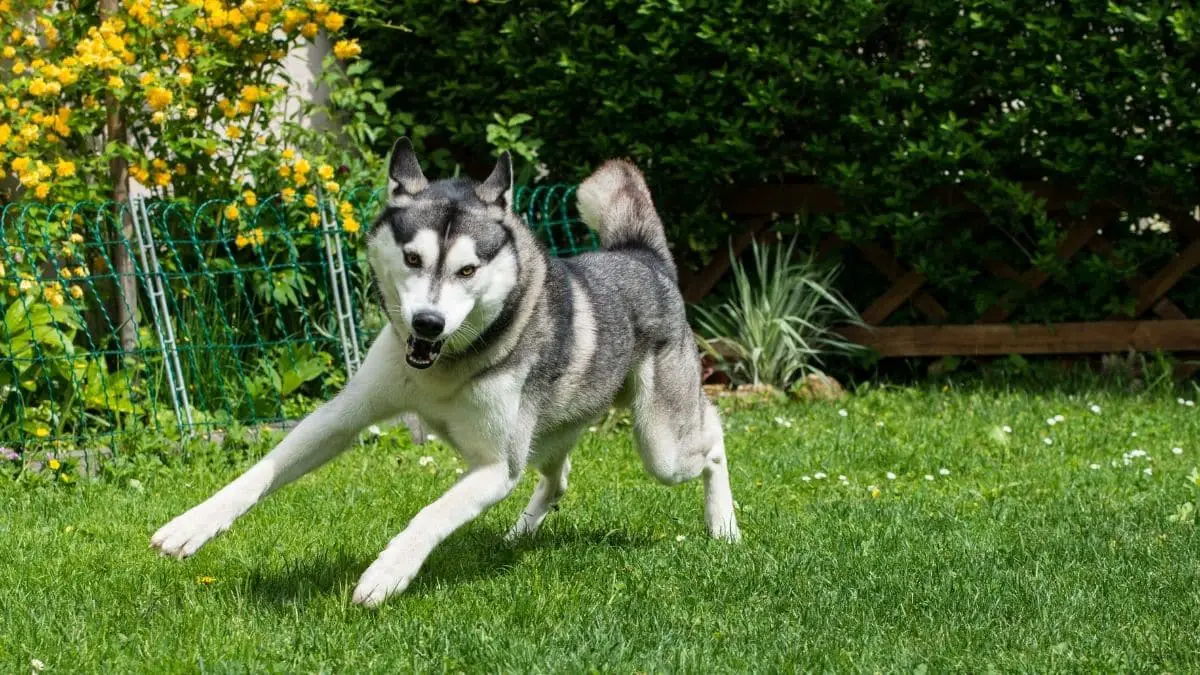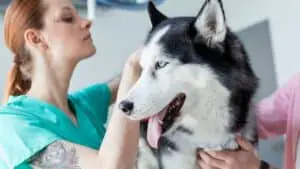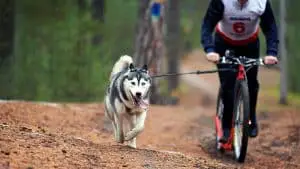Siberian Husky Allergies & Treatment Options
Many Husky owners know that the job of taking on a Siberian Husky is an important responsibility. As well as the usual requirements of feeding, training, grooming, and exercise, you are also responsible for your Husky’s health. In the case of a Siberian, this requires you to be on the lookout for allergy symptoms.
While Siberian Huskies are generally considered a strong and healthy breed of dog, they are prone to allergies. In fact, while it can be distressing to think that your beloved Husky is suffering, these allergies are a common occurrence and can be treated fairly easily. The most common allergic reaction your dog will suffer from relates to skin allergies, which will typically manifest as rashes on your Husky’s skin.
The allergies that a Siberian Husky suffers from are fairly common to other breeds of dogs also. It is important that you keep an eye on your Husky’s health, including any allergic reactions he might be suffering, and obtain veterinary advice as soon as possible. If monitored and treated correctly, there is no reason why your allergy-prone Siberian Husky should experience undue difficulty with his condition.
Table of Contents
What kind of allergies can my Husky have?
Skin allergies are the most common type of allergy in Huskies. If he is having an allergic reaction, your Husky may start to develop rashes on his skin. You will usually notice this when your Husky starts to scratch and rub at himself – he may even lose patches of fur. He will certainly be very uncomfortable, and will very likely let you know about it!
When you notice these signs in your Husky take him to the vet immediately for an examination and diagnosis. Your vet will be able to tell you whether your pup’s skin problems are related to an allergic reaction or something else, such as an infestation of fleas. In either case, getting your Husky the correct diagnosis and proper treatment is critical to his long term health and happiness.
What causes Siberian Husky allergies?
There are many factors that can cause an allergy flare-up in your Husky. A great many of these are the same factors that cause allergic reactions in other pets and animals.
Environmental factors, dust, and food are the most common culprits when it comes to pet allergies in your Husky. Just as humans can be susceptible to different types of allergens in their environment, so too can Huskies.
Environmental factors that can cause your Husky allergy trouble are mold, grass, and pollen. In addition to dust, these allergens can be somewhat difficult to control, making it somewhat difficult to treat these allergies without professional veterinary help.
Food allergies are slightly easier to get a handle on. If your Husky is allergic to a certain type of food, you are much more likely to pinpoint this food – after all, you’re the one who puts it in his bowl every day!
While not strictly an allergy, your Husky may also suffer from zinc deficiency, which can cause your Hound similar issues.
As it can be somewhat difficult to tell many of these allergies apart, it is crucial that you seek the advice of your vet as soon as you notice any symptoms.
Allergy symptoms in Siberian Huskies
Many of the allergy symptoms that your Husky may display will be the same, regardless of the allergen that has set him off.
The most common, and perhaps most obvious, will be hair loss. If your Husky is having a dermatological reaction to any environmental factors allergen such as grass, dust, or pollen, the irritation and rashes on his skin will cause his hair to fall out. He may even help the process along by repeatedly scratching himself in the irritated areas.
Food allergies can also result in hair loss and rashes, but will most frequently be accompanied by diarrhea. Although a small amount of diarrhea is normal, repeated, ongoing bouts of it are not. If you notice that your Husky always reacts in a certain way to certain types of food, then try changing it up.
Zinc deficiencies in your Husky will produce very similar symptoms to environmental and food allergies. If the deficiency is particularly bad, your Husky may even develop nasal solar dermatitis.
Although this condition is more common in Collies than Huskies, it can impact Siberians. It produces redness, flaky skin, and hair loss around the nose.
How do I treat my Siberian Husky’s allergies?
The first and most important thing to remember when it comes to treating your Husky’s allergies is that you will need to do so in close consultation with your vet. The common signs and symptoms of an allergic reaction in your Husky could actually be attributed to a great many causes – don’t ‘self-diagnose’ your pet!
Your vet may prescribe medicine to deal with both the underlying issue and any of the more ‘superficial’ problems it is causing. Ensure you always administer any medication from your vet in accordance with their directions.
Sometimes allergy treatment may involve a change in the environment. This could range from avoiding walks in high-pollen producing areas, investing in a vacuum with a HEPA filter, or changing your Husky’s diet.
While an allergen like dust may be hard to control and avoid, you can help your Husky out by engaging in regular brushing – this will help remove some of these pesky allergens and dead skin from his coat. Keeping the house clean (with that HEPA vacuum we mentioned!) is another great way to minimize your pet’s exposure.
An important thing to note is that you will need to closely observe and monitor your Husky when he is being treated for allergies. Some changes in his condition may require a vet’s attention, especially if you suspect that your Husky may have developed an allergy to his medicine. In such a case, the consequences could be fatal if the reaction is not detected early and addressed.
All in all, Siberian Huskies are quite a healthy breed and do not require too much medical attention or too many visits to the vet. Still, it does not hurt to have him checked up every now and then especially if any signs of allergies show up.
Siberian Husky allergies are easily treatable. When untreated, however, they may begin to cause your dog a high level of discomfort, and may even develop into more serious health problems.
Frequently Asked Questions
Do Siberian Huskies have allergies?
Just like many other pets, Siberian Huskies can suffer from allergies. Skin allergies and food allergies are the most common.
If you suspect your Husky may be suffering from an allergy, familiarize yourself with some of the more common symptoms. Although many of these symptoms will be the same, regardless of the actual cause, keeping track of your Husky’s health can help your vet understand the precise nature of what might be causing your Husky discomfort.
Are Siberian Huskies hypoallergenic?
Huskies are not a hypoallergenic dog breed. In fact, Huskies are notorious for the amount of hair they shed, due to the unique nature of their double coat.
This double coat has two layers. The topcoat, a longer coat made up of straight guard hairs, and the undercoat, a thick, fluffy coat made up of crimped hairs.
The topcoat will be shed all year round. This is no different from other non-hypoallergenic breeds. The undercoat, however, undergoes a special twice-yearly shed, known as ‘blowing the coat’‘. During these times, you’d be forgiven for thinking that your Husky has no fur left, given the amount lying around your home!
The sheer quantity of hair that a Husky sheds means that they are not suitable for sufferers of a pet allergy. Allergy sufferers would be better off seeking another breed for their family pet!
Are Siberian Huskies prone to skin problems?
There are a couple of skin disorders that Huskies are particularly prone to. These largely stem from the fact that Huskies are genetically inclined to zinc deficiencies.
If your Husky is zinc deficient, he means that he lacks the correct enzymes that allow him to absorb zinc correctly. This leads to hair loss, itching, and even the formation of lesions on your Husky’s face, genitals, and footpads.
If you notice any of these signs or suspect that your Husky may be zinc deficient, take him to the vet immediately, Your vet will conduct a skin biopsy to determine whether your dog is indeed zinc deficient, or if another disease is causing these symptoms.
Zinc deficiency can also lead to nasal dermatitis – in fact, this manifestation of zinc deficiency is often the first sign that many owners pick up on because it is so obvious.
Similar to run of the mill zinc deficiency, nasal dermatitis will lead to redness, itching, pigment loss, and lesions on the nose.
Again, if you notice these signs, take your Husky to the vet for a proper diagnosis. Your vet will be able to assist you with the best course of treatment and help get your Husky back to fighting fit.







